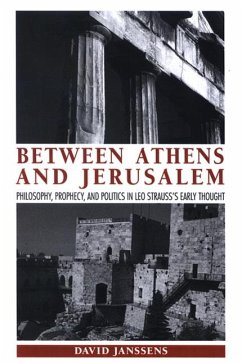Praised as a major political thinker of the twentieth century and vilified as the putative godfather of contemporary neoconservatism, Leo Strauss (1899-1973) has been the object of heated controversy both in the United States and abroad. This book offers a more balanced appraisal by focusing on Strauss's early writings. By means of a close and comprehensive study of these texts, David Janssens reconstructs the genesis of Strauss's thought from its earliest beginnings until his emigration to the United States in 1937. He discusses the first stages in Strauss's grappling with the "theological-political problem," from his doctoral dissertation on Friedrich Heinrich Jacobi to his contributions to Zionist periodicals, from his groundbreaking study of Spinoza's critique of religion to his research on Moses Mendelssohn, and from his rediscovery of medieval Jewish and Islamic philosophy to his research on Hobbes. Throughout, Janssens traces Strauss's rediscovery of the Socratic way of life as a viable alternative to both modern philosophy and revealed religion.
Dieser Download kann aus rechtlichen Gründen nur mit Rechnungsadresse in A, D ausgeliefert werden.


